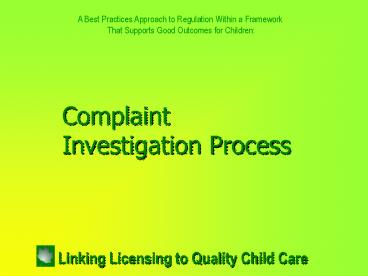A comprehensive infrastructure that supports Quality Child Care - PowerPoint PPT Presentation
1 / 15
Title:
A comprehensive infrastructure that supports Quality Child Care
Description:
A Best Practices Approach to Regulation Within a Framework ... to Quality Child Care is a joint project of Child Care Connection Nova Scotia ... – PowerPoint PPT presentation
Number of Views:35
Avg rating:3.0/5.0
Title: A comprehensive infrastructure that supports Quality Child Care
1
Complaint Investigation Process
2
Linking Licensing to Quality Child Care is a
joint project of Child Care Connection Nova
Scotia and the Provincial/Territorial Directors
of Child Care/Early Childhood Development
Services. The project is funded through the
Government of Canadas Social Development
Partnerships Program. The opinions and
Interpretations reflected in this presentation
and in the project are those of the authors and
do not necessarily reflect those of the
Government of Canada.
3
How Complaints are Investigated
- The purpose of the complaint investigation
process is - To ensure that children in the child care
facility are safe and receiving proper care - To identify any areas of non-compliance with the
Licensing Act - To implement any follow-up strategies that might
be needed
4
The Investigation Process
Intake
Outcome/Follow up
Investigation Framework
Risk Assessment
Collection of Evidence
Immediate Response
5
Intake - How Complaints are Made
- Someone believes that inappropriate care is being
provided to children and they complain to the
government department that is responsible for the
licensing of those facilities. These complaints
may be made anonymously - Complainants concerns are considered his/her
view of the situation - Complainants are asked to define and document
his/her concerns - If concerns fall within the mandate of licensing
standards for child care, an investigation is
initiated - Licensing works in cooperation with other
jurisdictions if complaint falls within the
mandate of the other jurisdictions.
6
Risk Assessment - How complaints are investigated
- The evidence provided by the complainant is
examined to determine if children are at risk in
the child care facility. - How quickly the complaint is investigated is
determined by the risk - Low risk The facility may be in non-compliance
with Regulation, but there is no immediate risk
to children. - Medium risk There is low immediate risk, but
with continued exposure to the situation, the
risk of physical or emotional injury increases. - High risk The situation is emergent or critical.
If the situation continues, it is probable that
further injury (physical or emotional) will
result.
7
Case Example Preschool Room
- I heard the caregiver in the pre-school room
tell a little boy that he was a brat and she
hated him.
8
Case Example Kindergarten Room
- In the kindergarten age room, a childs drawing
was torn up by the staff person and thrown in the
garbage. The child was told that the picture was
not good enough to keep.
9
Case Example 3 Year Old Room
- My child came home in dirty underwear. I think
the staff in the 3 year old room should be
helping the children with their toilet needs.
10
Immediate Response
- The first concern of the investigator is to
ensure the safety of the children in the child
care facility
11
Collection of Evidence
- Evidence can be collected by using
- Interviews
- Observation
- Surveillance
- Photography
- Scene drawing
- other methods
12
(No Transcript)
13
(No Transcript)
14
Outcome/ Follow Up
- The information obtained throughout the
investigation is assessed and it is determined if
all reasonable enquiries have been made. If so,
the Investigator analyzes the information and
determines - If the evidence does or does not support/confirm
the allegation. - OR
- If the evidence is unclear/conflicting and
requires additional investigation or follow up.
15
Complaint Investigation Process
Intake
Outcome/Follow up
Investigation Framework
Risk Assessment
Collection of Evidence
Immediate Response































